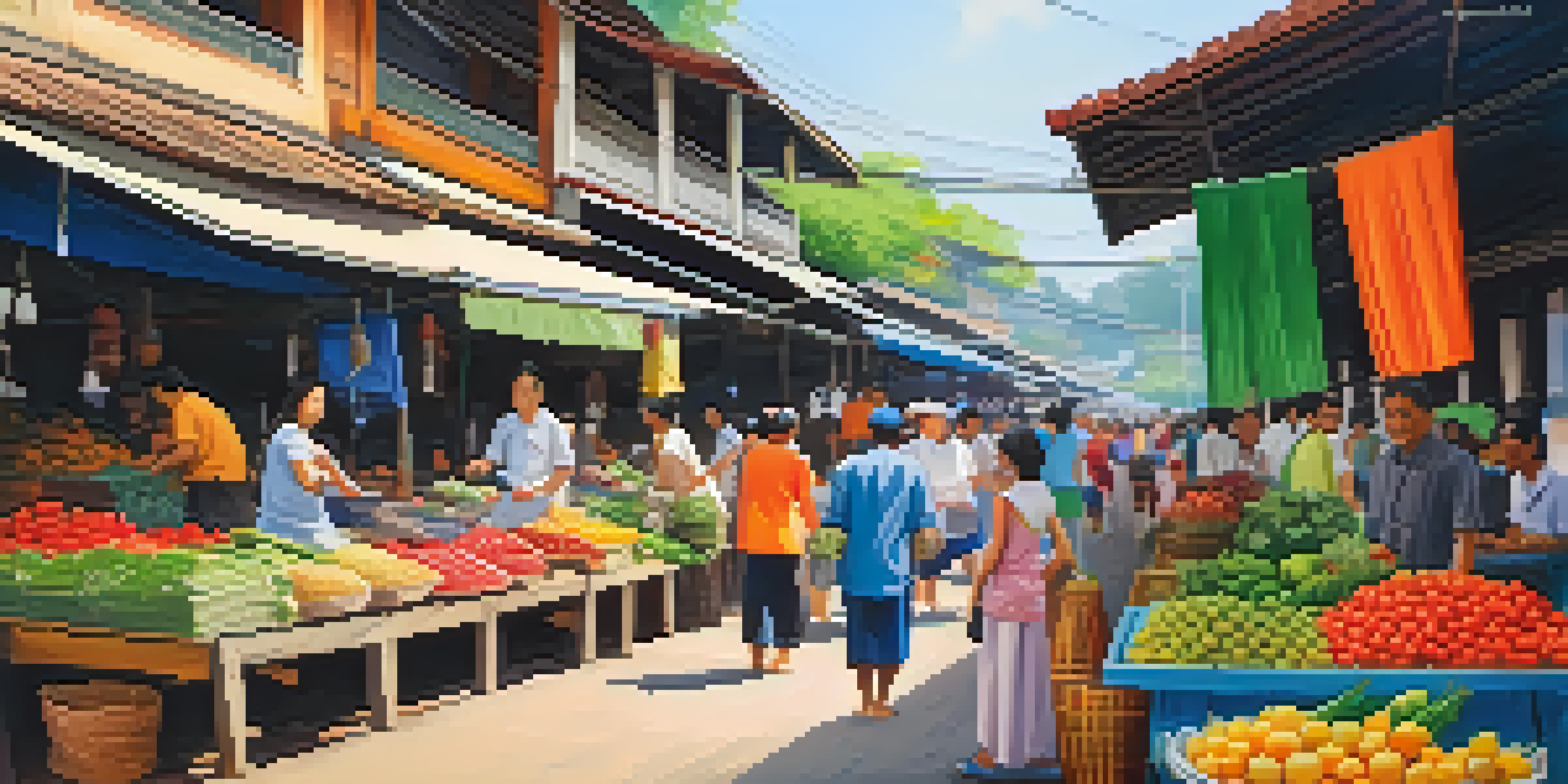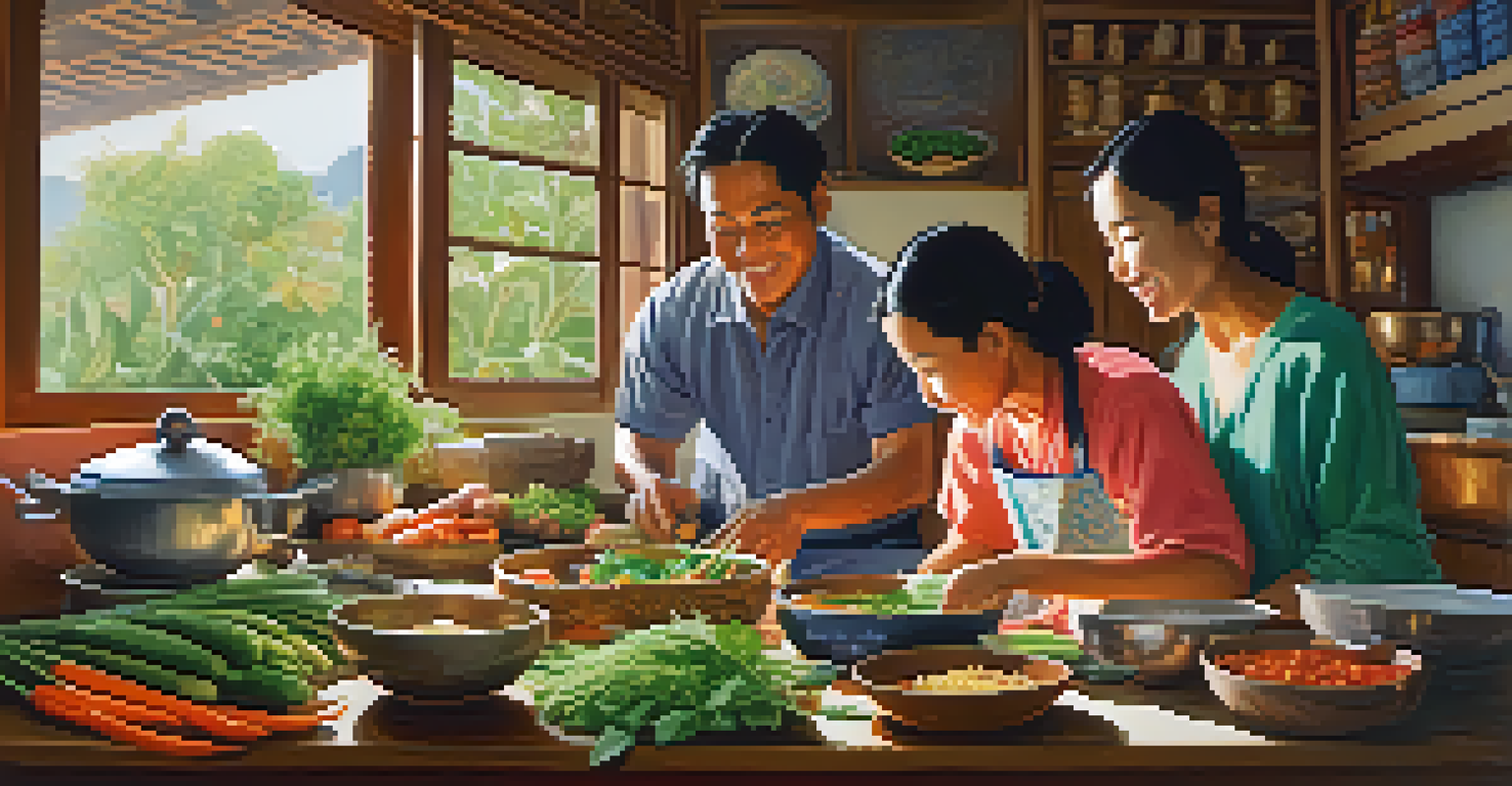Understanding Thai Culture Through Cultural Exchange Programs

The Essence of Thai Culture: An Overview
Thai culture is a beautiful tapestry woven from traditions, beliefs, and practices that have evolved over centuries. Rooted in Buddhism, it emphasizes respect, kindness, and community, which are integral to daily life in Thailand. From colorful festivals to intricate art forms, every aspect reflects a deep connection to history and spirituality.
Traveling tends to magnify all human emotions.
Understanding Thai culture requires more than just reading about it; it involves experiencing it firsthand. This is where cultural exchange programs come into play, offering immersive opportunities to engage with local traditions. Participants gain insights that textbooks simply can't provide, making the experience truly transformative.
Additionally, these programs foster meaningful relationships between locals and visitors. By sharing meals, stories, and experiences, participants create bonds that transcend cultural differences, enriching their understanding of what it means to be Thai.
Benefits of Participating in Cultural Exchange Programs
Cultural exchange programs offer numerous benefits, not just for participants but also for the host culture. Through these programs, individuals gain a deeper appreciation for diversity, enhancing their worldview. This broadened perspective can lead to increased empathy and understanding, qualities that are essential in today's interconnected world.

Moreover, these exchanges encourage skill development. Participants often learn new languages, cooking techniques, or traditional crafts, all of which add value to their personal and professional lives. Engaging in local customs fosters adaptability, a key trait in navigating global interactions.
Cultural Immersion Enhances Understanding
Participating in cultural exchange programs allows individuals to experience Thai traditions firsthand, fostering a deeper appreciation for the culture.
Finally, cultural exchange programs contribute to sustaining local cultures. By involving participants in traditional practices, communities can showcase their heritage while ensuring it remains vibrant and relevant. This reciprocal relationship benefits everyone involved, creating a lasting impact.
Key Components of Thai Cultural Exchange Programs
Most cultural exchange programs in Thailand include a mix of language learning, community service, and cultural immersion activities. Language classes help participants break down communication barriers, allowing for more meaningful interactions. This foundational skill is often the first step in truly understanding the heart of Thai culture.
The world is a book, and those who do not travel read only one page.
Community service plays a pivotal role, as it enables participants to give back while learning about local issues. Whether it's teaching English in rural schools or participating in environmental conservation efforts, these experiences foster a deeper connection with the community. They also highlight the importance of social responsibility, a core value in Thai society.
Cultural immersion activities, such as cooking classes, traditional dance lessons, or temple visits, provide hands-on experiences that deepen understanding. Each activity is a doorway into the rich world of Thai traditions, allowing participants to appreciate the nuances that define the culture. These experiences are often the most memorable parts of an exchange program.
Exploring Thai Cuisine Through Cultural Exchanges
Thai cuisine is renowned for its bold flavors and vibrant presentation, making it an essential part of cultural exchange programs. Participants often have the opportunity to take cooking classes, where they learn to prepare traditional dishes such as Pad Thai or Tom Yum. These culinary experiences offer a delicious way to connect with Thai culture.
Food is more than just sustenance in Thailand; it’s a social activity that brings people together. Sharing meals with locals allows participants to experience the warmth of Thai hospitality, creating cherished memories. These moments around the dinner table often lead to discussions about culture, family, and traditions.
Building Lasting Connections
Engaging with local communities and host families during cultural exchanges creates meaningful relationships that enrich both visitors and locals.
Through these culinary adventures, participants gain insights into the significance of ingredients and cooking methods in Thai culture. For instance, the use of fresh herbs and spices reflects the importance of balance and harmony, key principles in Thai philosophy. This understanding enhances their appreciation of the cuisine long after the program ends.
Engaging with Local Communities: A Unique Opportunity
One of the most rewarding aspects of cultural exchange programs is the chance to engage directly with local communities. Participants often stay with host families, which provides an intimate view of daily life in Thailand. This experience fosters a sense of belonging and offers a genuine perspective on the culture that’s often missed in tourist settings.
Involvement in local festivals and ceremonies allows participants to witness and partake in traditions that have been passed down through generations. From Songkran (the Thai New Year) to Loy Krathong (the Festival of Lights), these events showcase the richness of Thai culture. Participants not only enjoy the festivities but also learn about the values and stories behind them.
Building friendships with locals creates a supportive network that extends beyond the program. These connections often last a lifetime, leading to future opportunities for collaboration or travel. Such relationships emphasize the mutual benefits of cultural exchange, enriching both the visitors and the host community.
Overcoming Cultural Barriers Through Exchange Programs
Cultural exchange programs serve as a bridge to overcome misunderstandings and stereotypes that often exist between cultures. By immersing themselves in Thai culture, participants discover the complexities and beauty that may not align with preconceived notions. This firsthand experience helps dispel myths and fosters a more nuanced understanding.
Participants also learn to navigate cultural differences, which can be a challenge initially. For instance, understanding the significance of the 'wai' (a traditional Thai greeting) can help participants feel more integrated. Such lessons are invaluable, as they promote respect and appreciation for different ways of life.
Promoting Diversity and Empathy
Cultural exchange programs broaden participants' worldviews, encouraging empathy and understanding in an increasingly interconnected world.
Ultimately, these programs encourage open-mindedness and adaptability. By embracing new experiences and perspectives, participants develop skills that are essential in our globalized society. This journey of understanding can lead to personal growth and lifelong friendships, breaking down barriers in the process.
The Lasting Impact of Cultural Exchange on Participants
The impact of participating in cultural exchange programs often extends far beyond the duration of the trip. Many participants return home with a renewed sense of purpose, a deeper understanding of themselves, and a desire to promote cultural awareness. This newfound perspective can inspire them to share their experiences and educate others about Thai culture.
Additionally, alumni of these programs often engage in advocacy, championing cultural preservation and community development initiatives. Whether through volunteer work, educational outreach, or social media, they become ambassadors for the cultures they’ve encountered. This ripple effect can foster greater appreciation for diversity in their communities.

Ultimately, the experience of cultural exchange leaves an indelible mark, shaping participants' views and encouraging them to become more culturally aware citizens. As they share their stories and insights, they contribute to a growing movement that values understanding and respect among cultures worldwide.